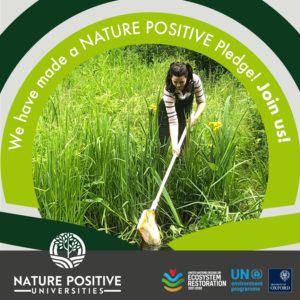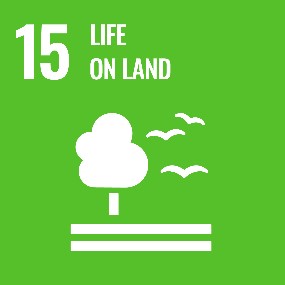Ecology
There are 12 Nature Improvement Areas (NIA) throughout England and our new Waterside Campus sits within the Nene Valley Way Nature Improvement Area, making biodiversity of Waterside Campus a fundamental part of the university’s sustainability ethos. The generation of a Biodiversity Management Plan as part of our planning has provided the basis for enhancing the natural habitat and the creation of new habitat. This includes planting species that attract insects and pollinators, which in turn attracts birds, bats and other wildlife. We are committed to the aims set out in our Ecology Policy (PDF, 175KB) to ensure the continual management, conservation and education of ecology at the UON.
University of Northampton staff are actively involved in managing, monitoring and developing the flora and fauna on campus. Sightings of 78 bird species on or around the university grounds, species include the Peregrine, Kingfisher, Robin and Little Owl.
Ecology Zone
The new Ecology Zone, created in 2017, uses natural soils and substrates to create a varied habitat for wildlife. A recent survey of the Ecology Zone by the Botanical Society of Britain & Ireland recorded a total of 65 plant species in the Ecology Zone, with a further 79 species recorded across Campus, including plants previously thought extinct or rare in the county such as the Small-flowered Catchfly. You can also expect to see otters, heron, kingfisher, wetland birds, bats, dragonflies, butterflies and bees on Campus.
Nature Positive Universities

We depend on nature for our survival, and nature depends on us. This is a critical time to stand up for nature. We believe that as a university, we can use our power and influence to help lead our community on a Nature Positive journey, uniting both the climate and biodiversity crises to build more resilient ecosystems, help nature recover and limit climate change.
To be Nature Positive there must be a measured biodiversity baseline, timeframe, a target, clear actions, analysis of how actions add up, monitoring and transparent reporting. UON have made a pledge to become Nature Positive by 2030 and are currently writing our Biodiversity Plan in lines with this pledge, with an aim to have this in place by 2026/27.
Hedgehog Friendly Campus
UON are proud to have been awarded GOLD accreditation for the Hedgehog Friendly Campus awards 2022/23! This accreditation is valid for 3 years and as of July 2025 we have signed up to the 2025/2026 gold award which will be audited around May 2026.
Hedgehog Friendly Campus is a national biodiversity engagement programme, that supports universities, colleges, students’ unions and primary schools to create positive change for hedgehogs and other wildlife on their campus. Criteria within our framework sets out to protect biodiversity, enhance habitats and educate staff and students on their own impacts.

What is No Mow May?
No Mow May is an annual campaign encouraging owners and managers of green spaces to refrain from mowing their lawn throughout the month of May. By this simple yet effective act, it gives nature a much-needed boost by:
- Helping native wildflowers and grasses
- Creating a buzzing buffet for bees and butterflies
- Locking away carbon below the ground
- Helping tackle pollution
Why are we taking part in No Mow May?
As a university we believe that we have a responsibility to lead by example in protecting natural environments and halting nature loss. Allowing wildflowers to grow freely throughout May provides essential foraging and nesting sites for important pollinators, such as bees, butterflies and moths. As pollinators are responsible for the reproduction of many plant species, they play a critical role in biodiversity gain, underpinning healthy ecosystems.
The Environment and Sustainability Team and Grounds Maintenance Team have worked together to take part in No Mow May each year since 2023 and in 2025, wooden posts were decorated by staff and students with spring themes and placed in the wild areas each year. You can read more about the event.

United Nations Sustainable Development Goals
We use the United Nations Sustainable Development Goals (SDGs) as a framework to guide our activity. Our ecology policy and projects are linked to the following SDGs:

Find out more about our impact on the SDGs
